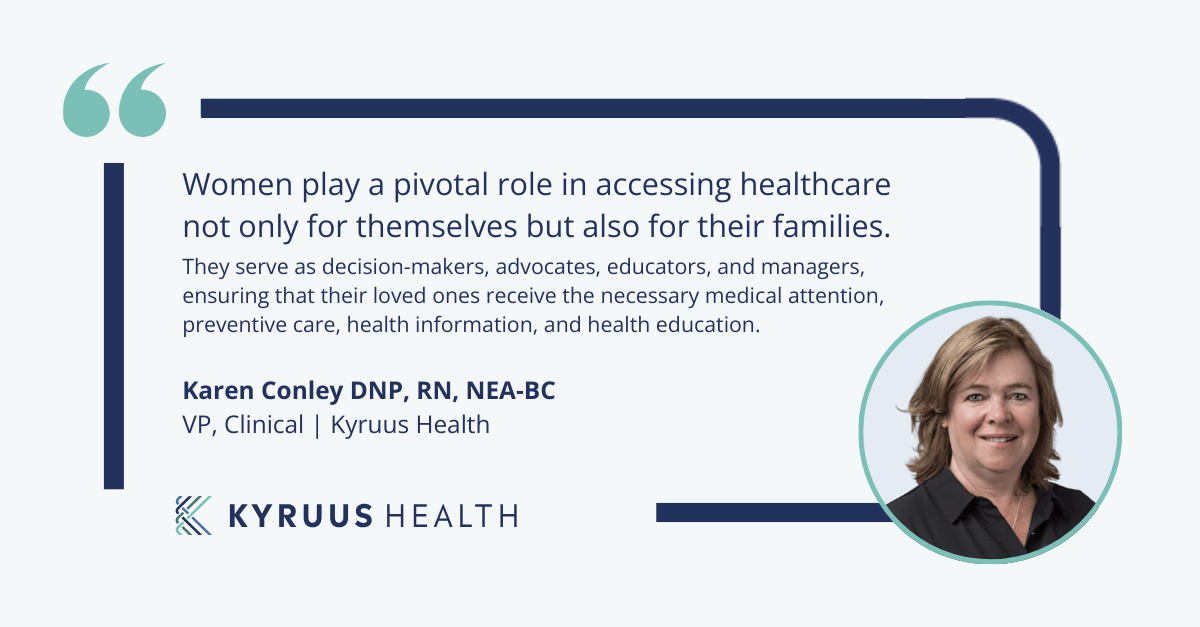In honoring Women’s History Month, Kyruus Health is proud to amplify the voices within our vibrant community. This series, “Celebrating Women: Voices from our Kyruus Health Community,” unfolds a tapestry of stories that weave through the unique journeys of our Kyruunauts, Board of Directors, and customers.
By sharing these narratives, we aim to foster a deeper understanding of the rich mosaic of women experiences, resilience, and contributions within Kyruus Health. As we navigate identity and care access, these insights serve as beacons, guiding us toward a more inclusive, equitable, accessible, and compassionate healthcare landscape.
Join us in celebrating the diverse voices that shape Kyruus Health, embodying the spirit of unity, strength, and shared humanity — continuing with Karen Conley.
Karen Conley DNP, RN, NEA-BC
Vice President, Clinical
Tell us a bit about your background and the story of how you came to be connected to Kyruus Health?
After spending almost 30 years in clinical and nursing executive roles in academic health systems I decided to make the leap to healthcare technology. The concept of improving access to care for people across the United States instead of focusing on one health system was the draw for me. The original mission of Kyruus was to enable human beings to care for other human beings and because of that focus and after meeting the team (in particular a few very smart, strong, and impressive women) I knew this was the place for me.
How would you describe your experience with this identity?
From a career perspective, I was fortunate to have been drawn to nursing which today, in the United States, is 85% women. Working with colleagues in my field I did not experience marginalization as compared to women in other industries dominated by men. That said, the majority of physicians I worked with were men and there were situations where I did feel ignored or dismissed. These situations made me stronger and throughout my career I gained insight and skills around engaging with and collaborating with individuals with biases against women. I know that my actions in these types of situations served as opportunities to learn and grow for all involved.

What is something about you that you want others to know more about?
1. My childhood hometown is the Birthplace of Women’s Rights.
I grew up in Seneca Falls, NY, a small town in the Finger Lakes Region of New York State, which is recognized as the Birthplace of Women’s Rights. The very first Women’s Rights Convention was held from July 19-20 in 1848. The statement “All Men and Women are Created Equal” was the key phrase in the Declaration of Sentiments which was signed at this historic convention by over 100 women leaders. Rights expressed in this declaration also included a woman’s right to vote, to access education, to earn their own money, to own property and to have custody of their children in the event of divorce or death of a spouse.
The organizers of the convention were Elizabeth Cady Stanton and Lucretia Mott. These women met in 1840 at the World’s Anti-Slavery Convention in London where they were both refused admittance based on their gender. Living in a world where men’s voices dominated and women’s voices went unheard frustrated them enough to organize and execute this landmark convention.
It took 70 years following this first historic convention to finally pass the 19th Amendment giving all women the right to vote. These amazing and courageous women got us started on this road for equal rights for all United States women…. A journey that we are still on today.
Seneca Falls, NY is the home of the National Women’s Hall of Fame and the Women’s Rights National Historical Park.
2. I am a member of the Council for Women at Boston College
As a proud alumnus of Boston College I jumped at the chance to join the Council for Women at Boston College (CWBC) in 2008. CWBC is an affinity group of women alumni from 41 states and 7 countries. We exist to support women alumni and students through mentoring and educational programs. We support other BC affinity groups as well as the University overall. I have had amazing experiences with this group through mentoring nursing students and early careerists, developing relationships with the amazing CWBC women and being exposed to international women leaders.
From your perspective, what does celebrating Women’s History Month mean to you?
Women’s History Month is a time for me to pause and reflect on the incredible progress that women have made throughout history. It is also a time to celebrate the contributions of women today while recognizing that we still have challenges to face together. It is a reminder that women are powerful, capable, and resilient.
How would you encourage your colleagues to honor and celebrate this month?
We all have women in our lives worthy of celebration and there are several ways to do so:
- Raise awareness of their accomplishments: Make it a point to recognize the accomplishments of your colleagues, friends, and family members. Be specific about your praise including why you are proud of her and how her achievements have impacted you.
- Elevate and inspire young women: This month is the time to inspire young people to achieve their full potential. Teaching them about the women who came before them can help them to see that anything is possible.
How do you perceive the role of care access in health for women?
Women play a pivotal role in accessing healthcare not only for themselves but also for their families. They serve as decision-makers, advocates, educators, and managers, ensuring that their loved ones receive the necessary medical attention, preventive care, health information, and health education. Their contributions significantly impact the overall healthcare landscape and contribute to better health outcomes for individuals and families across the United States.



